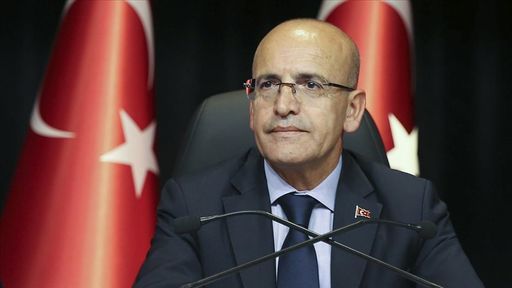In a world shadowed by economic uncertainty, Türkiye stands out as an exception.
While the World Bank has slashed growth forecasts for many major economies due to rising trade barriers and geopolitical tensions, it has upgraded Türkiye’s 2025 GDP growth forecast from 2.6 percent to 3.1 percent, signalling confidence in the nation’s economic resilience.
Analysts say Türkiye’s vibrant domestic market, strategic investments, and diversified trade relationships are paving the way for a promising future.
Professor Baris Alpaslan of the Social Sciences University of Ankara attributes Türkiye’s bright economic outlook to a series of smart domestic moves that have bolstered stability and investor confidence.
“Türkiye has made notable progress in narrowing its current account deficit, strengthening international reserves, and reducing risk premiums,” he tells TRT World.
A country’s current account goes into a deficit when it spends more on imports than it earns from exports. Türkiye has worked hard to minimise this gap, importing less relative to its exports and tourism revenue – a strategy that has made its economy more stable, he says.
This stability has encouraged foreign investors to see Türkiye as a safe bet.
Türkiye’s domestic consumption – which is the total amount of money people and businesses spend on goods and services for their use – is another reason for Türkiye’s improving economic prospects, Alpaslan says.
“Despite global challenges, Türkiye’s domestic consumption remains robust, supported by a large and youthful population,” Alpaslan says.
Picture bustling markets in Istanbul or Ankara, where young families buy groceries, clothes, and gadgets, keeping shops busy and the wheels of the economy spinning. This steady demand for goods and services, from retail to housing, acts like an engine of economic growth, even when global demand slows.
The Turkish government’s focus on infrastructure also plays a starring role. “The government continues to prioritise investments in infrastructure projects, including transportation and energy, which generate jobs and enhance long-term productivity,” Alpaslan says.
A diversified industrial base
Türkiye’s diverse industries further strengthen its position. “The economy benefits from a diversified industrial base, encompassing automotive, electronics, textiles, and construction,” Alpaslan says.
This is like having a well-stocked toolbox: if one tool – say, textiles – faces a slowdown, others like automotive or electronics can pick up the slack, keeping the economy steady.
Tourism, too, is a gem in Türkiye’s crown. “The sector has demonstrated resilience, with increasing numbers of international visitors supporting foreign exchange earnings and job creation,” he adds.
Professor Murat Aslan of Ankara Yildirim Beyazit University echoes this optimism, pointing to Türkiye’s disciplined economic policies as a key driver.
“The classical orthodox programme introduced by Mehmet Simsek (minister of the treasury and finance) adopts a high-interest-rate regime to curb demand and fight inflation,” he says. This approach is like turning down the heat on a boiling pot to keep it from overflowing – high interest rates slow excessive spending, helping stabilise prices.
As a result, Aslan says, monthly inflation in May 2025 was lower than expected, creating a stable environment for businesses and consumers alike.
Aslan also highlights the surge in domestic spending as a growth engine. “Expectations point to a big rise in spending by both individuals and the government in 2025,” he says.
For example, the government’s efforts to rebuild infrastructure after earthquakes are pouring money into construction, creating jobs for workers and demand for materials.
More money in people’s pockets
Meanwhile, a 30 percent hike in minimum wage in January 2025 has put more money in people’s pockets. “This made actual income and consumption levels in households even better,” he says, likening it to families having extra cash to buy school supplies or dine out, boosting local businesses.
Türkiye’s export success, particularly in military and aerospace, adds to its economic shine. “The military and aerospace industries set new records for exports,” Aslan says, noting its significant growth of 147 percent to $884 million in March 2025 from last year.
Falling global oil prices have also helped by lowering the cost of energy imports, easing pressure on the economy, much like a family saving money when gas prices drop.
Facing global trade challenges, such as US tariffs, Türkiye is well-positioned to adapt, according to both experts.
Alpaslan emphasises Türkiye’s diversified trade partnerships. “Türkiye has actively diversified its trade relationships, particularly across the Middle East, North Africa, Central Asia, and Africa,” he says.
Türkiye’s Customs Union with the EU, which is being modernised, also provides a stable trade lifeline, ensuring access to European markets. “This may help mitigate some of the effects of US trade measures,” Alpaslan adds.
Aslan sees Türkiye’s geostrategic position as a unique advantage. With Europe relying on Türkiye for political and military support, and with ties to energy-rich regions, Türkiye holds strong bargaining power.
“Türkiye occupies a critical bridge for Chinese goods en route to Europe,” he says.
“Türkiye can marshal its human capital and strategic assets at the negotiation table,” Aslan says, turning its location into a tool for securing favourable trade deals.
















